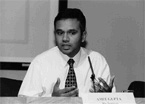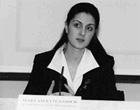2001 Summer Forum
Cautious Optimism Expressed at EMTA’s Summer Forum in London
Approximately 150 Emerging Markets professionals gathered on June 28, 2001 for EMTA’s Fourth  Annual Summer Forum in London. The event, which was again hosted by Deutsche Bank, included two wide-ranging panel discussions that addressed such issues as the financial crises in Argentina and Turkey, the effects of the US economic slowdown, Bush administration policy vis-à-vis the multilaterals, burden-sharing, oil pricing, capital flows as well as predictions for most EM countries. Jerome Booth (Ashmore Investment Management) led the discussion of sell-side experts while Citigroup Investments’ Mark Franklin again chaired EMTA’s investor panel.
Annual Summer Forum in London. The event, which was again hosted by Deutsche Bank, included two wide-ranging panel discussions that addressed such issues as the financial crises in Argentina and Turkey, the effects of the US economic slowdown, Bush administration policy vis-à-vis the multilaterals, burden-sharing, oil pricing, capital flows as well as predictions for most EM countries. Jerome Booth (Ashmore Investment Management) led the discussion of sell-side experts while Citigroup Investments’ Mark Franklin again chaired EMTA’s investor panel.
Sell-Side Panel Adopts Cautious Tone
Eric Fine (Morgan Stanley) summarized the comments of many of the panelists when, noting his cautiousness towards the EMs in general, he commented "we’re in a phase of the market that’s a pretty risky one…it’s being led primarily by inflows, not by improving fundamentals, a very different situation from 1999 and 2000 when we’d be writing pieces and saying here are six good pieces of news."
 David Sekiguchi (Deutsche Bank) stated that, because of past and potential tax reforms as well as oil pricing, the outlook on Russia looks as bright as it ever has since the dissolution of the USSR. While some panelists
David Sekiguchi (Deutsche Bank) stated that, because of past and potential tax reforms as well as oil pricing, the outlook on Russia looks as bright as it ever has since the dissolution of the USSR. While some panelists noted the potential risk in owning Russian debt should oil pricing drop, Philip Poole (ING Barings) stressed that this was somewhat mitigated by the broadening of the Russian tax base and reduced tax evasion. Poole warned however that "President Putin has to push forward with a fairly broad range of reforms," if Russia is to continue to grow, and added that the sustainability of growth is also an important risk factor.
noted the potential risk in owning Russian debt should oil pricing drop, Philip Poole (ING Barings) stressed that this was somewhat mitigated by the broadening of the Russian tax base and reduced tax evasion. Poole warned however that "President Putin has to push forward with a fairly broad range of reforms," if Russia is to continue to grow, and added that the sustainability of growth is also an important risk factor.
 Asked about the prognosis for Argentina, Robin Hubbard (J.P. Morgan) noted that despite the time Buenos Aires had bought by completing a $29.5 billion mega-swap, "in the long term, they’re still between a rock and a hard place, in terms of the policy options they have to get the economy growing. You can argue that they need to do more fiscal adjustment, but clearly, fiscal adjustment in a time of no growth is very politically difficult."
Asked about the prognosis for Argentina, Robin Hubbard (J.P. Morgan) noted that despite the time Buenos Aires had bought by completing a $29.5 billion mega-swap, "in the long term, they’re still between a rock and a hard place, in terms of the policy options they have to get the economy growing. You can argue that they need to do more fiscal adjustment, but clearly, fiscal adjustment in a time of no growth is very politically difficult."
Sekiguchi commented that, despite years of reforms, Latin America remains highly dependent on commodity exports—even Chile, he noted, undoubtedly the star of Latin America with 25 years of reform progress and an open economy, still depends largely on copper exports. Such dependency makes Latin countries extremely vulnerable to global slowdowns. While EMTA’s panel of Sell-Side experts remained concerned by the implications of the economic slowdown in the US, speakers generally concurred that a potential credit event in Argentina posed a greater risk to EM debt.
Investor Panel Picks Russia and Ecuador as Favorites
Russian and Ecuadorian debt instruments were the most frequently mentioned countries with significant upside potential, according to EMTA’s investor panel. Amit Gupta (MN Services) stated he believed that Ecuador was a candidate for tightening by a couple of hundred basis points, while Tom Fallon (Fortis Investment Management) expressed satisfaction that the country’s currency board seems to have taken root.
 Maryam Ettehadieh (Credit Suisse Asset Management) called Russia a "compelling story," but cautioned against "euphoria" while panel moderator Mark Franklin (Citigroup Investments) opined that Russian equities and Soviet assets which have not yet been restructured are of the greatest interest to him. Paul Murray-John (Zurich Scudder) offered Venezuela as a country with possible downside risk, based on declining official reserves and capital flows out of the country.
Maryam Ettehadieh (Credit Suisse Asset Management) called Russia a "compelling story," but cautioned against "euphoria" while panel moderator Mark Franklin (Citigroup Investments) opined that Russian equities and Soviet assets which have not yet been restructured are of the greatest interest to him. Paul Murray-John (Zurich Scudder) offered Venezuela as a country with possible downside risk, based on declining official reserves and capital flows out of the country. 
Panelists concurred that it was too early to determine the new US administration policy concerning the  international financial institutions, with Franklin commenting "…My instinct is not only will [the new administration’s policy] be reactionary to a crisis, I’m not convinced it will necessarily be positive for the markets." Fallon added that despite the rhetoric, policy would likely continue to be made on a case-by-case basis.
international financial institutions, with Franklin commenting "…My instinct is not only will [the new administration’s policy] be reactionary to a crisis, I’m not convinced it will necessarily be positive for the markets." Fallon added that despite the rhetoric, policy would likely continue to be made on a case-by-case basis.
Investor panelists suggested that the extreme market negativity towards Argentina might be over-done; Gupta commented that, despite some investors’ belief that a default is inevitable, "in reality, this is something, where if you think in terms of a chess game, could be a potential outcome six or seven or eight steps down the road." Murray-John cited support from local investors, and Ettehadieh noted she was "perhaps on the more optimistic side of the entire spectrum of views…because I think that there will be something engineered." Ettehadieh added that it is the portfolio manager’s job to constantly be accessing whether the returns on a country’s debt is adequate payment for assuming a country’s default risk, and suggested that spreads might justify long positions in Argentine debt.
Finally, investors were concerned about possible derailments in emerging European countries joining the EU, and believed that this had not been factored into debt pricing. Fallon was concerned that a delay in Polish accession may force a change in the calendar for other countries such as Hungary. However, Ettehadieh and Murray-John echoed Sell-Side analyst Poole’s choice of Bulgaria as one of the most promising credits in the region, while Gupta chose Ukraine as a potential out-performer.